|
|
|
Sort Order |
|
|
|
Items / Page
|
|
|
|
|
|
|
| Srl | Item |
| 1 |
ID:
139581
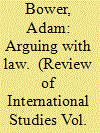

|
|
|
|
|
| Summary/Abstract |
Recent studies have highlighted the instrumental use of language, wherein actors deploy claims to strategically pursue policy goals in the absence of persuasion or socialisation. Yet these accounts are insufficiently attentive to the social context in which an audience assesses and responds to strategic appeals. I present a theoretical account that highlights the distinctly powerful role of international law in framing strategic argumentation. Legalised discourses are especially legitimate because law is premised on a set of internally coherent practices that constitute actors and forms of action. I then illustrate the implications in a hard case concerning US efforts to secure immunities from International Criminal Court jurisdiction. Contrary to realist accounts of law as a tool of the powerful, I show that both pro- and anti-ICC diplomacy was channelled through a legal lens that imposed substantial constraints on the pursuit of policy objectives. Court proponents responded to US diplomatic pressure with their own legal arguments; this narrowed the scope of the exemptions, even as the Security Council temporarily conceded to US demands. While the US sought to marry coercion with argumentative appeals, it failed to generate a lasting change in global practice concerning ICC jurisdiction.
|
|
|
|
|
|
|
|
|
|
|
|
|
|
|
|
| 2 |
ID:
166156
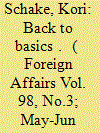

|
|
|
| 3 |
ID:
129803


|
|
|
|
|
| Publication |
2014.
|
| Summary/Abstract |
Looking primarily at the Israeli side of the conflict, one sees many factors that have contributed to the failure of past peace efforts, most of which may be present or repeated in current (2014) and possibly future - attempts at peace making.
|
|
|
|
|
|
|
|
|
|
|
|
|
|
|
|
| 4 |
ID:
102840
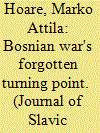

|
|
|
|
|
| Publication |
2011.
|
| Summary/Abstract |
The war in Bosnia-Hercegovina of 1992-1995 altered the course of world politics and had a major impact upon the global consciousness. Yet one of the decisive episodes of this war has been almost wholly ignored in the existing literature: the Bihacacute crisis of autumn 1994. This essay analyzes the role of this crisis in determining the course both of international, particularly US diplomacy, and of the war on the ground. The paradoxical results of the US-led international intervention in Bosnia-of NATO military power being used to coerce the Bosnian Serb rebels to accept a settlement highly favorable to them, in which Bosnia-Hercegovina was simultaneously both reunified and partitioned-may be traced back to this forgotten crisis.
|
|
|
|
|
|
|
|
|
|
|
|
|
|
|
|
| 5 |
ID:
128746
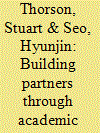

|
|
|
|
|
| Publication |
2014.
|
| Summary/Abstract |
Science can serve as an attractive mode for trust building and cooperative engagement between countries where formal political or diplomatic relations have been strained or are nonexistent. In this article we discuss some conditions and constraints for bilateral academic science engagement and suggest how such engagement might help to build trust between the United States and North Korea. We analyze longitudinal data on North Korea's diplomatic ties and international academic collaboration as well as US public opinion data to provide context for US-North Korea science engagement. We argue that bilateral academic science engagement should be attractive to the United States and North Korea and suggest a set of policy measures that might facilitate such engagement.
|
|
|
|
|
|
|
|
|
|
|
|
|
|
|
|
| 6 |
ID:
129799
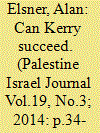

|
|
|
|
|
| Publication |
2014.
|
| Summary/Abstract |
During the many years of US Diplomacy in the Middle East, it has become a cliché to state that the United States cannot want peace more than the Israelis and Palestinians themselves.
|
|
|
|
|
|
|
|
|
|
|
|
|
|
|
|
| 7 |
ID:
129801
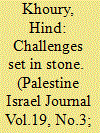

|
|
|
|
|
| Publication |
2014.
|
| Summary/Abstract |
What are the challenges to peace in 2014? The date is worth emphasizing, since attempts to broker peace in the Middle East are anything but new. In fact, the 1979 David Accords with Egypt are already 35 year old, and the Israeli-Palestinian peace process in entering its 23rd year. The process is growing stronger, but genuine peace is weakening by the day. In the meantime, there have been countless studies, articles, books, maps and reports addressing all aspects in the conflicts.
|
|
|
|
|
|
|
|
|
|
|
|
|
|
|
|
| 8 |
ID:
190194
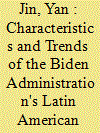

|
|
|
| 9 |
ID:
138724
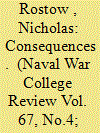

|
|
|
|
|
| Summary/Abstract |
This article examines possible consequences of U.S. and NATO withdrawal from Afghanistan, Russian annexation of Crimea and claims to territory inhabited by ethnic Russian citizens of other countries, and Chinese claims to control large adjacent areas of the Pacific Ocean. Fundamental principles of world public order are at risk or directly challenged in Afghanistan, Ukraine, and the western Pacific. They are not unique locations in this respect, but this article is not a review of all aspects of U.S. diplomacy and policy or of international relations since the end of the Cold War.
|
|
|
|
|
|
|
|
|
|
|
|
|
|
|
|
| 10 |
ID:
102698
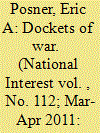

|
|
|
|
|
| Publication |
2011.
|
| Summary/Abstract |
SMART BOMBS cannot take out WikiLeaks. Stealth bombers cannot eliminate the bad odor wafting around Guantánamo Bay. Unmanned drones armed with Hellfire missiles cannot stop foreign countries and NGOs from putting America "on trial" for targeted killings. Lawfare is taking over international relations-or so many people believe. The most awesome military power in the world blunders about like a helpless giant in a dark room, swarmed by hostile forces that it cannot see and cannot attack.
|
|
|
|
|
|
|
|
|
|
|
|
|
|
|
|
| 11 |
ID:
113551


|
|
|
|
|
| Publication |
2012.
|
| Summary/Abstract |
The battle for public opinion in the Islamic world is an ongoing priority for U.S. diplomacy. The current debate over why many Muslims hold anti-American views revolves around whether they dislike fundamental aspects of American culture and government, or what Americans do in international affairs. We argue, instead, that Muslim anti-Americanism is predominantly a domestic, elite-led phenomenon that intensifies when there is greater competition between Islamist and secular-nationalist political factions within a country. Although more observant Muslims tend to be more anti-American, paradoxically the most anti-American countries are those in which Muslim populations are less religious overall, and thus more divided on the religious-secular issue dimension. We provide case study evidence consistent with this explanation, as well as a multilevel statistical analysis of public opinion data from nearly 13,000 Muslim respondents in 21 countries.
|
|
|
|
|
|
|
|
|
|
|
|
|
|
|
|
| 12 |
ID:
139960
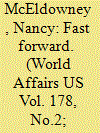

|
|
|
|
|
| Summary/Abstract |
When scanning the international scene today, it is tempting to see shadows of a dark past. Feudal powers annexing neighboring territories, maniacal cults perpetrating atrocities, pandemics threatening to wipe out entire societies—many of today’s top challenges have an eerie resemblance to upheavals of the medieval period. While there is indeed some validity to these parallels, they represent only a partial view of the extraordinarily complex realities unfolding in front of us. We face daunting challenges, to be sure, but we also face unprecedented opportunities for progress, as global poverty levels recede, access to education and medical care expand with the ranks of an international middle class, and technological advances put almost unlimited knowledge and influence into the hands of millions of individuals. Charting a way forward in the midst of this complexity—blunting threats to our security at home, seizing opportunities to advance our interests around the world, and working where possible to alleviate human suffering—is the task of American diplomacy. And if the world of tomorrow looks anything like what the trends of today suggest, effective diplomacy, and effective diplomats, will be more crucial to our national success than ever before.
|
|
|
|
|
|
|
|
|
|
|
|
|
|
|
|
| 13 |
ID:
131449
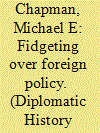

|
|
|
|
|
| Publication |
2013.
|
| Summary/Abstract |
When David Kennedy's magisterial Freedom from Fear criticizes Franklin Roosevelt's East Asian policy making it is to suggest that "a little appeasement-another name for diplomacy-might have yielded rich rewards." Some 430 pages earlier, Kennedy passed over the Stimson Doctrine, except to attribute its "timid" stance to isolationist public opinion, stressing instead how, "On the wind-scoured plains of Manchuria, Japan thus set the match in 1931 to the long fuse that would detonate the attack on Pearl Harbor." By setting aside what I call Tenaka teleology to concentrate on the psychological and ideological reasons for Henry Stimson's persistent interventionism following the Mukden (Shenyang) Incident, this article seeks to build on Kennedy's intimation that diplomatic appeasement could have slowed, detoured, or even stopped the Japanese juggernaut. After emphasizing Stimson's initial inaction, and then showing how U.S. diplomats and State Department officials-Stimson included-approved of Japan's involvement in Manchuria and sympathized with its difficulties there, this article argues that far from leaving well alone as realpolitik sensibilities demanded, Stimson acted instead to satisfy a string of personal affronts to his honor. God-fearing American elites, in his understanding, shouldered the responsibility of extending civilization westward, into Asia. As Secretary of State for the nation so charged by providence, Stimson internalized his role as the arbiter of moral behavior. Upstart Orientals running amok in the Pacific, particularly when they claimed to emulate Americans, roiled the order he felt it was his duty to police, offending his sense of self and jeopardizing his legacy.
|
|
|
|
|
|
|
|
|
|
|
|
|
|
|
|
| 14 |
ID:
115608
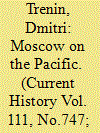

|
|
|
|
|
| Publication |
2012.
|
| Summary/Abstract |
Even as the Obama administration has pivoted toward the Asia-Pacific region, so has the Kremlin. .
|
|
|
|
|
|
|
|
|
|
|
|
|
|
|
|
| 15 |
ID:
116612
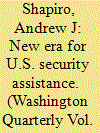

|
|
|
|
|
| Publication |
2012.
|
| Summary/Abstract |
As the United States transitions from a decade of war, it is clear that the task of maintaining global stability and addressing global challenges must be a shared responsibility. Working with allies and partners to address common security challenges has been a critical part of U.S. policy for decades. But the increased interconnectedness associated with global economic advances, while bringing prosperity to more countries and regions, has also meant that the security of the United States can be affected by events in more places, more countries, and more regions. This has led to an increased demand to expand our partnerships and deepen our security relationships. As Secretary Clinton noted recently, "building coalitions for common action is becoming both more complicated and more crucial."1
|
|
|
|
|
|
|
|
|
|
|
|
|
|
|
|
| 16 |
ID:
129804
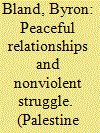

|
|
|
|
|
| Publication |
2014.
|
| Summary/Abstract |
The purpose of a peace process is to reach and implement an agreement that ushers forth peace. The belief is that negotiations will lead to a settlement that, if properly implemented, will create peace where previously only animosity and violence had existed. Acting under this paradigm international actors- the United States, the European Union, the United Nations, etc.
|
|
|
|
|
|
|
|
|
|
|
|
|
|
|
|
| 17 |
ID:
128733
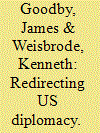

|
|
|
|
|
| Publication |
2013-14.
|
| Summary/Abstract |
The international system of nation-states is evolving into something more complex and indeterminate. One important development has been the creation of regional communities. If these are to thrive in their own distinctive way, national governments, including the United States, will need to support creative policies that harmonize interests, not only within such communities but also among them. Policy planners, therefore, must think globally and regionally.
|
|
|
|
|
|
|
|
|
|
|
|
|
|
|
|
| 18 |
ID:
115340
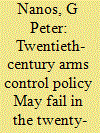

|
|
|
|
|
| Publication |
2012.
|
| Summary/Abstract |
Beginning in the early 1980s, the central theme of U.S. diplomacy with the former Soviet Union and now Russia has been the mutual reduction of the overwhelming destructive capability of strategic arsenals as a means to reduce the primary threat to America. The record of accomplishment is impressive. Not only are the allowed force levels in the latest agreement dramatically lower than their Cold War peaks, the New START Treaty continues and builds on protocols that have created unprecedented transparency and confidence. It is time to ask: What is the next step that will have the highest payoff in reducing the nuclear threat to America? Between the United States and Russia, where the strategic calculus is very well understood, further bilateral stockpile reductions in the near term will lead to only limited improvements in national security. Priority and resources should be shifted to understanding how to deal with the emerging realities of a multipolar nuclear world, where risks can be just as grave and the techniques for managing them are not as well understood.
|
|
|
|
|
|
|
|
|
|
|
|
|
|
|
|
|
|
|
|
|